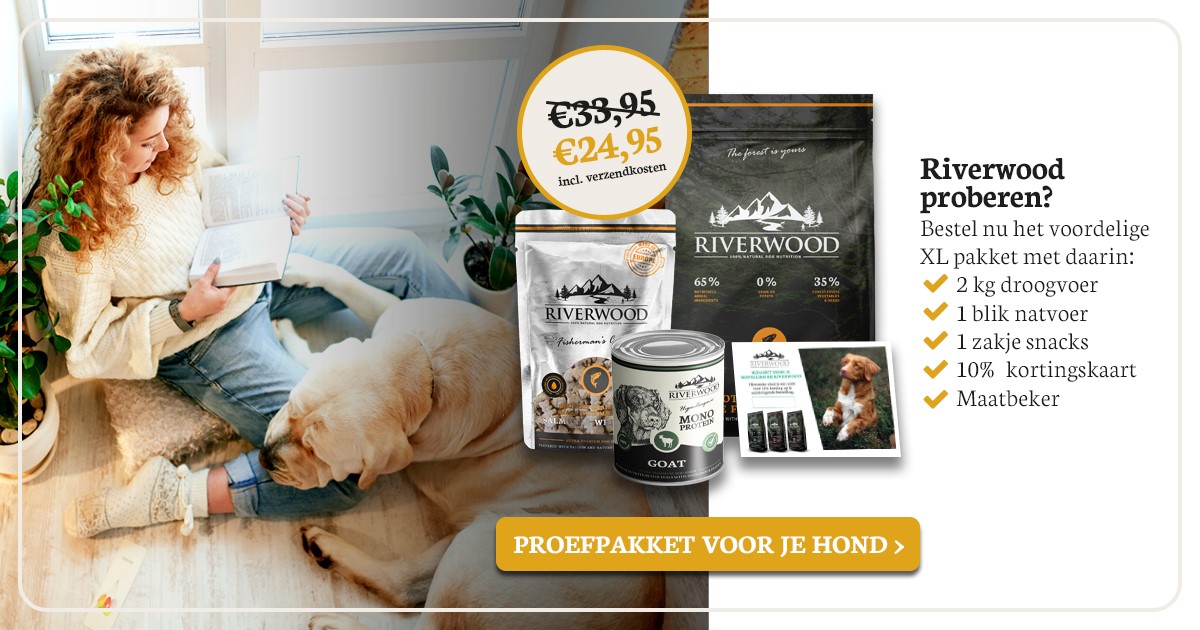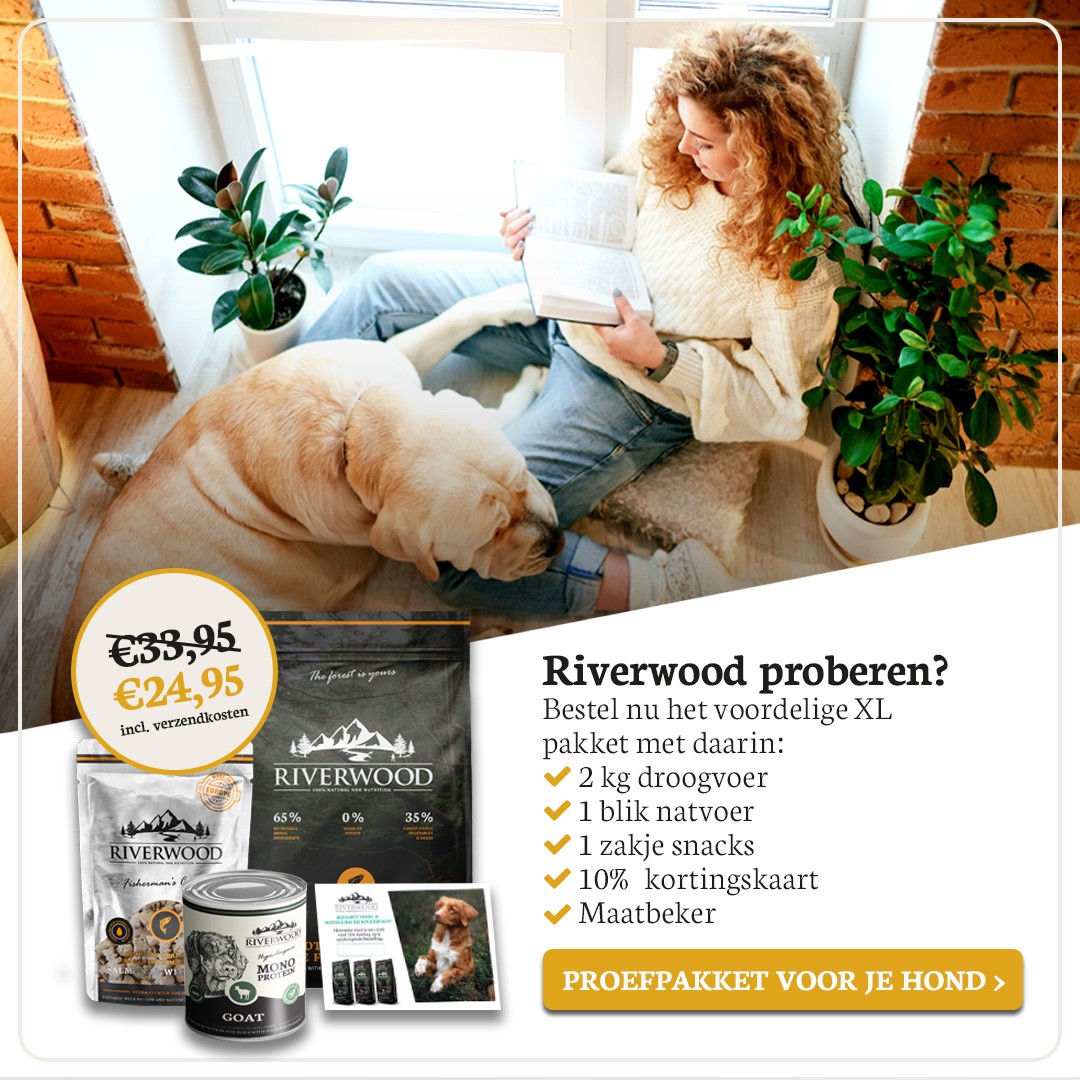Underweight pets: causes and tips
Most of the information you can find about keeping pets at a healthy weight is written from the standpoint that you should try to prevent animals from gaining weight and becoming overweight. Of course this is very important, but what about if your dog or cat is actually underweight? It makes sense that more nutrition will help the animal gain weight, but how do you do this responsibly? In this blog you will read more about how to recognize underweight, what causes underweight and how to help your pet gain weight in a healthy way.

Causes of pet underweight
A pet's body consumes a certain amount of energy every day. The animal gets this energy from the diet in the form of fats, proteins and carbohydrates. When consumption equals the energy a pet takes in, the energy balance is balanced and the animal's weight remains the same. When the animal takes in more energy than it consumes, it gains weight. If it takes in less energy than it consumes, it will lose weight.
Below we discuss the most common causes of pets losing weight:
Picky eater
Some dogs and cats will eat just about anything and everything, while others are harder to persuade when it comes to food. For example, they may be sensitive to taste, texture and the times they are fed.
Stress or fear
Whether it's thunderstorms, fireworks, strange people visiting, a new roommate or going to the groomer, for example, all of these events can cause anxiety and/or stress in your pet. Stress-related weight loss is therefore also definitely a possible cause of underweight animals.
Illness, injury or pain
If your pet is losing weight or his appetite, there may be an underlying disease or injury. Pain is another cause why the animal may be losing weight. Do you suspect your dog or cat is suffering from something? If so, visit your veterinarian to rule out medical causes such as thyroid problems, digestive problems or dental conditions.
Parasites
It is very important for a dog or cat to be dewormed regularly because parasites such as worms or Giardia can cause an animal to lose weight. Nutrients are not adequately absorbed into the body due to parasites. A dog or cat may also develop diarrhea, feel weak and appear constantly hungry.
Too much or too little exercise
Some dogs or cats are simply very active but do not get enough nutrients to maintain their weight. On the other hand, pets that do not exercise much may have a decreased appetite.
Age
Dogs and cats tend to lose weight as they age, such as due to changes in activity levels, appetites and illnesses.
Malnutrition
If your dog or cat eats its daily meals well but still loses weight, it is advisable to check that the animal is getting enough nutrition in a day. Look for the correct recommended daily amount on the package of the food the animal is receiving. Keep in mind that the amounts recommended on the packages are only suggestions. Do you feel that your pet needs more food than is recommended? If so, make the portions slightly larger.
Risks of being underweight in pets
Although being overweight in pets is more common than being underweight, being underweight is at least as dangerous for an animal. This is because if a dog or cat is too thin, muscle tissue will be broken down so that the body will still get all the essential protein. As a result, the pet will have less energy and less strength, which increases the risk of physical injury and/or accidents. Also, vital organs do not receive enough nutrients to function properly. Finally, underweight pets have a less functioning immune system, which increases the risk of disease.
How do you know if your pet is underweight?
Whereas in one animal it is very obvious to see if it is too thin, in another it can be more difficult to determine if it is underweight. Especially in pets with thicker or longer fur, it can be difficult to see. The rule of thumb is that at an ideal weight, the animal's ribs are not visible, but can be easily felt. When viewed from above, you can clearly see the waistline. At underweight, you can clearly see the ribs, hips and spine. In addition, muscle mass is clearly reduced and the animal has no body fat. Pets that are too thin often also have lower energy levels and may even be depressed. Also, the coat will look duller and drier. Finally, a lot of shedding is also a symptom of being underweight.
Do you doubt that your pet is too thin? If so, consult your veterinarian.
How can you help your pet gain weight?
When a pet has lost a lot of weight, it is important to determine the cause of the weight loss. Sudden significant weight loss may signal illness or other health problems. When this is the case, contact your veterinarian to determine or rule out any health problems.
Every pound goes through the mouth, right? It is often thought that being underweight can be solved by simply feeding the animal more. Unfortunately, this is not true and there is much more involved in helping an animal gain weight responsibly than just giving them a little more kibble, wet food or snacks. Below we share some tips on how to help your pet gain weight in a healthy way yourself:
- Choose high-quality foods
To help a skinny pet gain weight, it is important that you choose good quality food that is high in fats and protein. This is because these two nutrients provide energy. Carbohydrates provide energy in addition to proteins and fats, but in large quantities are again not healthy for your dog or cat. Therefore, try to avoid foods with lots of fillers (such as wheat, rice, potatoes or other grains), as these contain few nutrients and in large quantities can cause digestive problems. Riverwood foods do not contain grains or potatoes. Instead, we chose yellow peas because of their low glycemic index. These carbohydrates are broken down slowly, which is better for healthy and stable blood sugar levels.
The variants with Reindeer, Deer & Wild Boar for dogs and Duck, Duck & Wild Boar for cats are particularly suitable for dogs and cats that can use extra energy. Both variants contain a high content of balanced and high-quality proteins and fats.
Tasty toppers
Do you have a very picky dog or cat that has lost a lot of weight because it leaves its food? Then you can choose to mix the kibble with a little wet food. The smell and texture of the wet food will probably encourage it to eat. With wet food, do choose high-quality foods with a high meat percentage. Riverwood's Mono Protein canned foods for dogs are single protein source based and consist of 70% meat. View the full range of Mono Protein canned dog foods here.
Would you rather not feed your four-legged friend a wet food? Then you can also choose a supplement as a topper over the diet. Riverwood Norwegian Salmon Oil is a dietary supplement suitable for both dogs and cats. The strong smell of the salmon oil can encourage eating. In addition, Norwegian Salmon Oil is also rich in unsaturated omega-3 fatty acids, which provide additional support for the skin and coat.
We have previously written blog articles with tips for picky dogs and cats. Tips for hard-eating dogs can be found here and in this blog you will find tips for hard-eating cats.
Give smaller portions of food and distribute them throughout the day
A good tip is to divide your dog's or cat's meals into three or four portions per day, rather than one or two large feedings per day. This is because smaller portions help the animal digest its food better and absorb the energy from the food better. Here, it is important that there be no more than six hours between meals.
Provide responsible snacks
Many snacks contain many calories. These snacks can be a good addition to your dog or cat's daily diet. However, choose healthy snacks. Healthy snacks contain natural ingredients and no added sugars or salt. Check out Riverwood's range of healthy reward snacks and natural chewy snacks for dogs here.
Keep the animal moving
It may sound a bit contradictory to recommend exercise for a dog or cat that needs to gain weight. After all, exercise actually burns calories, right? While that is true, exercise is actually beneficial because it helps a lean dog or cat build muscle mass. As an added bonus, the increased activity will increase their appetite. In addition, exercise is good for digestion. Just make sure there is at least 30 minutes between food and exercise.
Want to get your dog or cat more exercise? Keep in mind that you need to build it up slowly to avoid injuries if the animal is not used to extra exercise.
Weigh your pet regularly
Weighing your dog or cat weekly is a good way to keep track of your pet's weight. It gives a good idea of whether the animal has gained, lost or maintained its weight over time.
Keep a food diary
By keeping a food diary, you will be aware of all the nutrition your pet ingests in a day. In addition, you can in find out whether or not the strategy regarding making your four-legged friend gain weight is working. If the animal's weight changes at the next weigh-in - weight gain or loss - you can look back at the notes to see what happened.
With the above tips, you can work with your four-legged friend to make sure he regains a healthy weight!
Many pets already enjoy Riverwood every day. Would you also like your dog or cat to enjoy our delicious foods and are you curious which variety would suit your dog or cat best? Then answer some questions about your dog here or about your cat here and order an inexpensive sample pack.




